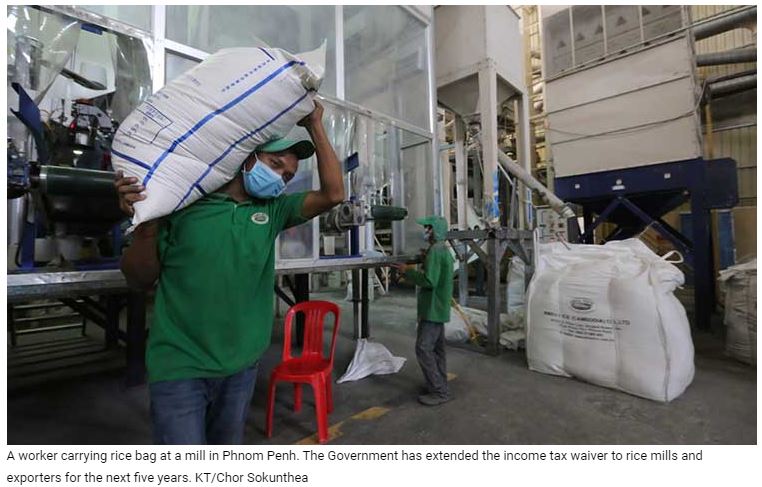Cambodia: Income tax for rice firms waived for 5 more years
To support the rice sector, the Cambodian government has extended the income tax waiver for companies (rice mills and exporters) in the segment for the next five years, according to the Ministry of Commerce.
This was announced by Minister of Commerce Pan Sorasak at a meeting on November 23.
“The Royal Government has always considered the competitiveness of the Cambodian rice sector by giving priority to everything, including the provision of all types of tax exemptions from 2011 to the present, and has continued to extend additional tax exemptions,” said the Commerce Minister.
Along with the income tax, the companies working in the rice sector are also exempt from paying fees and charges like the value-added tax (VAT) and withholding tax. “The Ministry of Economics and Finance provides a tax incentive to the enterprises that produce, supply, and export paddy, milled rice, beans, corn, black pepper, cassava, cashew nuts, and rubber. They are exempt from VAT and withholding tax but are required to follow the proper accounting norms and apply for the approval of incentives from the General Tax Department (GDT),” the Rice Federation of Cambodia (RFC) told Khmer Times in a reply to emailed queries.
“The extension of the tax exemption will help the rice companies and exporters maintain competitiveness in the export market as their operating costs, such as logistics and transportation, are a bit higher than neighbouring countries,” the RFC stated.
Without the Government’s support, the rice exporters would face many challenges to compete with firms from other countries, the RFC said and added, the move will also help them procure more paddy at better prices from farmers.
To rightly assess the farm-to-market cost of agricultural produce an in-depth and comprehensive study is being conducted with the cooperation and financial assistance of the Cambodia-Australia Agricultural Chain Programme, the Minister said.
To widen the market base for rice and rice products, the government is making efforts by including them in the list of goods under the free-trade agreements, as in the case of FTAs with China and South Korea. It’s also striving to make them part of trade pacts, like the Regional Comprehensive Economic Agreement (RCEP).
New understandings for the Cambodia-UAE Comprehensive Economic Partnership, where rice is also a priority commodity, are under active negotiations. “The Commerce Ministry’s team is negotiating with the UAE for FTA with milled rice figuring prominently on the priority list for discussion,” the RCF remarked.
“This agreement will expand the potential of new markets in the Middle East, where the market is currently very small, which we hope will help increase Cambodia’s rice exports even more,” said the Commerce Minister.
In January-October 2022, the Kingdom shipped 509,249 tons of rice worth $ 323.90, which was an increase of 10.67 percent over the same period of the previous year.
These trade agreements are helping in expanding the export of goods from Cambodia in a big way. In January-September 2022, the Kingdom exported $4,703 million worth of goods to the RCEP member countries, which was an increase of 6 percent over the same period of the previous year.
According to Penn Sovicheat, under-secretary of state at the Ministry of Commerce, the RCEP pact has contributed to the country’s export growth in the nine months of this year. “Since entering into force earlier this year, Cambodia’s export to the RCEP member states has significantly increased,” Sovicheat told Khmer Times earlier.


 Thailand
Thailand




